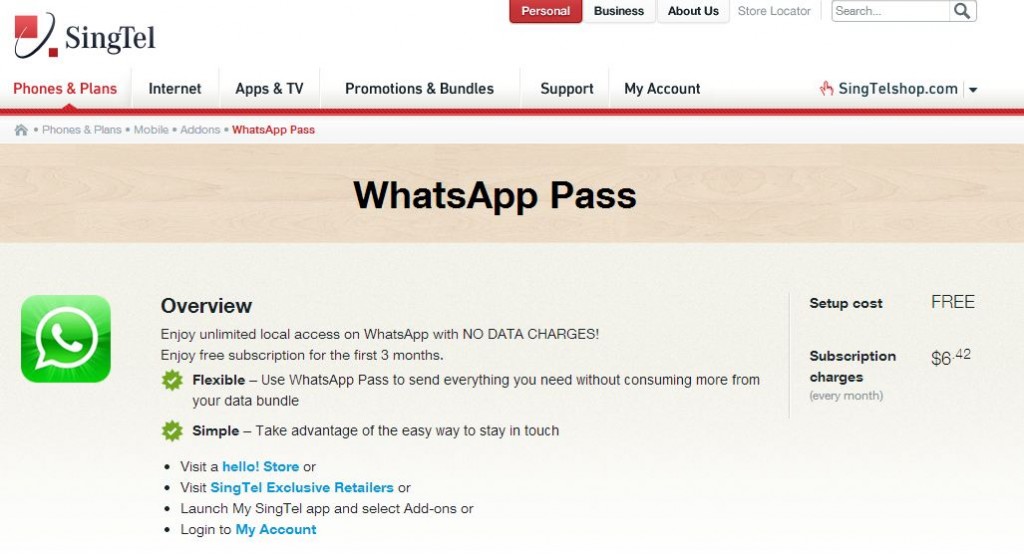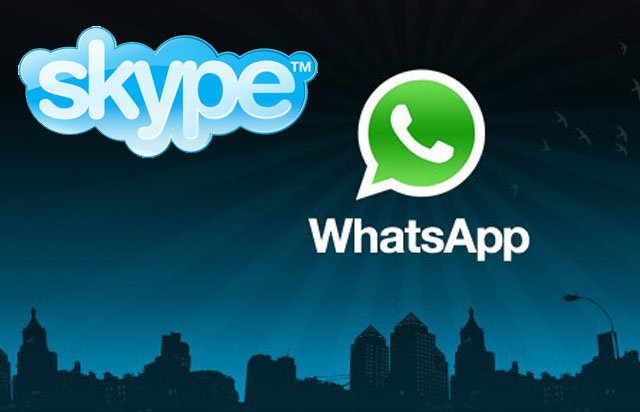SingTel chief executive Chua Sock Koong has urged regulators in Australia to give carriers like Singtel-owned Optus the right to charge WhatsApp and Skype for use of their networks or risk a major decline in network investment.
This did not go down well on the social media sphere in Singapore as many SingTel subscribers lamented that they are already paying for a data as part of their subscription plan with SingTel. Many are worried that they may have to pay more.
 SingTel has a WhatsApp add-on plan which allows users unlimited WhatsApp messaging without eating into subscriber's current data plan. [Source: SingTel]
SingTel has a WhatsApp add-on plan which allows users unlimited WhatsApp messaging without eating into subscriber's current data plan. [Source: SingTel]
Right now in the foreseeable future, you will not be paying extra for using WhatsApp or Skype on your mobile. But this issue is beyond just paying extra for WhatsApp or Skype.
Why should the world care?
To properly answer that question, there are two things you must know first: 1) Net Neutrality and 2) US appeals court has rejected federal rules that require internet providers to treat all web traffic equally - and what has happened at video-streaming service Netflix.
What is net neutrality?
Net neutrality is the principle that Internet service providers and governments should treat all data on the Internet equally, not discriminating or charging differentially by user, content, site, platform, application, type of attached equipment, and modes of communication.
In simpler terms, if you paid for an internet subscription, you should be able to visit any website without having a slowed down connection or having to pay more to visit a particular website at an acceptable speed.
What has a US appeal case got to do with any of this?
This was a complicated issue spanning more than five years and court cases. Long story short, Internet Service Providers (ISPs) in the United States like Verizon, Comcast, AT&T wanted to vary the speeds users can access various websites. They wanted a 'tier-ed Internet' where the websites pay to get in the top tier, and their site and service will run fast. If they don't, their site will be on the slow lane on the information superhighway.
 Is giving priority speeds to certain websites the future of the Internet? [Source: YouTube]
Is giving priority speeds to certain websites the future of the Internet? [Source: YouTube]
For example, websites like Amazon and Facebook face high volumes of traffic daily and thus take up more bandwidth of these ISPs. If they had their way, the ISPs can charge Amazon and Facebook a fee to ensure that users can access these websites normally, or even at a faster speed. On the flip side, if major websites refuse to pay this fee, it may experience throttled traffic, i.e. users may take longer than usual to load the website.
In January this year, Verizon won an appeal against the Federal Communications Commissions (FCC) where the FCC wanted to bar broadband providers from slowing or blocking selected Web traffic. ISPs have gotten what they want.
Where does Netflix fit in all of this?
Netflix streams video content over the internet to users mostly in the United States. However, during peak periods when users tune in to watch TV series premieres, Netflix accounts for one-third of the internet's traffic.
Fittingly, after Verizon's victory against the appeal, Netflix has signed a deal with ISP Comcast to gain direct access to its broadband network. Is Netflix signing the deal to ensure its viewers the fastest viewing experience or was it pressured to do so or risk facing throttled traffic? We do not know yet.
What has the United States got to do with SingTel's comments on WhatsApp and Skype?
If you draw parallels, SingTel or any other telco wanting to charge WhatsApp and Skype for using its network is similar to the United States ISPs wanting a 'tier-ed Internet'. WhatsApp and Skype exists on the World Wide Web/Internet and telcos/regulators exerting control over them is similar to Verizon winning the case to have control over slowing or barring services on its network. This will raise many questions and have many implications.
With Facebook acquiring WhatsApp, does it mean Facebook will be charged network usage fees by telcos if SingTel gets what it wants? Will that fee be passed onto consumers or will consumers experience throttled traffic to Facebook if Facebook refuses to pay?
If a telco is missing out on revenue generated by SMSes and phone calls, it can theoretically throttle the speed of over-the-top applications like WhatsApp and Skype or even block those applications to direct people back to its own services. Is this something consumers are ready to accept?
In future, should another essential service become a major bandwidth hog, will telcos similarly want to levy charges on it or block the traffic? Satirical news website New Nation paints a not-so-far-fetched future where emails could be charged a fee, especially if people flock from WhatsApp to emails instead for some reason.
Why should the world care?
SingTel's CEO was speaking at a global forum in Barcelona urging the Australian regulators to allow it to charge services like WhatsApp a fee. If regulators agree to this request, it is a very slippery slope to go down. The slope gets even more treacherous if more telcos and regulators around the world adopt this stance.
Restricting information flows from one person to next is not the path we should take. The World Wide Web's principle of being universal, royalty-free, de-centralised, built on open standards and collaboration is the reason why humankind has experienced tremendous knowledge growth in the past 25 years. Restricting web traffic goes against this principle.
 Internet with ERP ganties before you enter various websites is not impossible
Internet with ERP ganties before you enter various websites is not impossible
What is the worst that could happen?
Just imagine a world where the only websites you view on your computer are Facebook, YouTube and Amazon. Any other website will be too slow to be view-able. The only applications on your smart phone are the un-intuitive messaging and phone apps provided by your telco and the only websites you can view on your phone are the ones which pay top dollar to telcos.
This sounds very cynical and dystopian, but it does not mean parts of it will not happen.
It all starts with telcos wanting to charge Skype and WhatsApp for its network usage.
Related articles:
SingTel clarifies on Facebook that WhatsApp will be charged separately, gets bombarded by haters
4 ways to take advantage of SingTel’s WhatsApp plan
Top photo from Xatakamovil
If you like what you read, follow us on Facebook, Instagram, Twitter and Telegram to get the latest updates.
